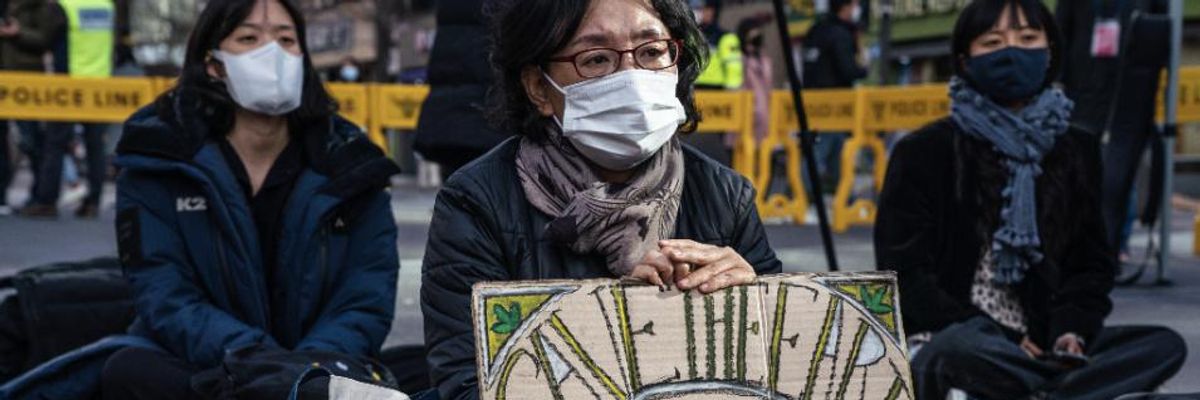Underscoring the necessity of a green, just recovery from the ongoing coronavirus crisis, a United Nations report released Wednesday warns that despite a brief pandemic-related drop in planet-heating emissions, the world is still on track to blast past the Paris climate agreement target temperature threshold.
"It doesn't make sense to use taxpayers' money to ruin the planet."
--U.N. Secretary-General Antonio Guterres
The Emissions Gap Report 2020, the latest edition of an annual publication from the U.N. Environment Program (UNEP), says that while the world is still headed for a temperature rise beyond 3degC this century--notably higher than the Paris agreement's aim to keep global heating to an increase well below 2degC in pursuit of 1.5degC--a green recovery could cut projected greenhouse gas (GHG) emissions for the next decade by about 25%.
Given that such a recovery--demanded of governments by climate activists across the globe throughout the year--could also put the world close to a 2degC pathway, the new report and U.N. Secretary-General Antonio Guterres are urging policymakers to improve national climate pledges before a 2021 summit and "use Covid-19 recovery as an opportunity to create more sustainable, resilient, and inclusive societies."
Countries' current Paris commitments, called nationally determined contributions (NDCs), are currently insufficient to meet the agreement's targets, and though governments are set to share their updated climate plans by the end of the year, some delays are expected due to the pandemic.
While warning that 3degC of warming "would spell catastrophe," Guterres emphasized in a video message Wednesday that "we have an opportunity."
"A sustainable pandemic recovery that prioritizes climate action can protect human health, jobs, and economies, and limit global warming," he said. "We are seeing a growing number of encouraging pledges for carbon neutrality. Our objective for 2021 is to build a global coalition for net-zero emissions. But we need to see these pledges turned into concrete action, backed with real action and investment, well in advance of the next climate change conference."
World leaders plan to commence the Climate Ambition Summit 2020 on Saturday to mark the fifth anniversary of the Paris agreement. The event is framed by the U.N. as "the sprint to Glasgow," referencing a summit scheduled to take place in the Scottish city in November 2021.
Guterres, in his video, directed the call to action particularly at rich countries--a message he reiterated in an interview with The Guardian. In terms of pursuing a green recovery, "it's not the same in all countries, but globally it's not happening," he said. "If you look at the G20 countries, and they represent probably 80% of the global economy, you have the recovery money used in fossil fuel-related industries and activities [that is] 50% more than the recovery money invested in the green economy."
"It doesn't make sense to use taxpayers' money to ruin the planet," added the U.N. chief, who has repeatedly called for transitioning to renewable energy, ending subsidies for the fossil fuel industry, and embracing nature-based solutions to the climate crisis. "We are close to a point of no return. We need to make sure that we act before that point of no return."
In a statement about the new report Wednesday, Inger Andersen, UNEP's executive director, echoed Guterres' call for bold, urgent action that seizes on the opportunity presented by the pandemic while also noting alarming projections and current conditions of the planet that were detailed in other recent U.N. publications.
"The year 2020 is on course to be one of the warmest on record, while wildfires, storms, and droughts continue to wreak havoc," said Andersen. "However, UNEP's Emissions Gap report shows that a green pandemic recovery can take a huge slice out of greenhouse gas emissions and help slow climate change. I urge governments to back a green recovery in the next stage of Covid-19 fiscal interventions and raise significantly their climate ambitions in 2021."
The report provides an update on the projected impact of countries' current climate pledges, and what could change if President-elect Joe Biden and Vice President-elect Kamala Harris rejoin the Paris agreement. The day after he lost the November election, President Donald Trump completed a long-promised withdrawal from the deal--which some climate scientists and activists have criticized for not being bold enough considering the anticipated consequences of the global temperature rising even 1.5degC.
Noting the mounting net-zero pledges from around the world, the report says that "to remain feasible and credible, it is imperative that these commitments are urgently translated into strong near-term policies and actions, and are reflected in the NDCs."
"At the time of completing this report, 126 countries covering 51% of global GHG emissions have net-zero goals that are formally adopted, announced, or under consideration," according to UNEP. "If the United States of America adopts a net-zero GHG target by 2050, as suggested in the Biden-Harris climate plan, the share would increase to 63%."
Guterres praised Biden for recently appointing John Kerry, the former secretary of state who helped craft the Paris agreement, as his climate envoy, telling The Guardian that "this is a demonstration that there will be a very strong commitment of the U.S. in relation to climate action next year."
"It is clear to me that the Paris agreement would not have been possible without the U.S. engagement and leadership," he added, "and it's clear to me that there is no chance to have a global net-zero coalition that is effective without the engagement and leadership of the U.S."

